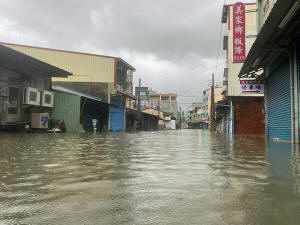Typhoon Gaemi sinks freighter off Taiwan, barrels towards Chinese
seaboard
 Send a link to a friend
Send a link to a friend
 [July 25, 2024]
By Ben Blanchard and Bernard Orr [July 25, 2024]
By Ben Blanchard and Bernard Orr
TAIPEI/BEIJING (Reuters) -Typhoon Gaemi swept through northern Taiwan on
Thursday, killing three people, triggering flooding and sinking a
freighter before barrelling west across the Taiwan Strait towards China
where it is expected to dump more torrential rain.
Gaemi made landfall around midnight (1600 GMT Wednesday) on the
northeastern coast of Taiwan in Yilan county. It is the strongest
typhoon to hit the island in eight years and was packing gusts of up to
227 kph (141 mph) before weakening, according to the Central Weather
Administration.
As of 17:00 p.m. (0900 GMT), Gaemi had crossed the Taiwan Strait and was
looming over China's coastal Fujian province.
Gaemi would be the biggest typhoon to hit China's eastern seaboard this
year, with its spiraling cloud-bands spanning most of the Western
Pacific Ocean and fuelling severe weather from the Philippines to
Japan's Okinawa islands.
In Taiwan, the storm cut power to around half a million households,
though most are now back online, utility Taipower said.
Some parts of southern Taiwan are expected to have recorded accumulated
rainfall of 2,200 mm (87 inches) since Tuesday.
The typhoon is expected to bring more rain across Taiwan in its wake,
with offices and schools as well as the financial markets closed for a
second day on Thursday.

Trains will be stopped until 3 p.m. (0700 GMT), with all domestic
flights and 195 international flights cancelled for the day. The high
speed train linking north and south Taiwan will re-open at 2 p.m. (0600
GMT).
Three people have died and 380 injured due to the typhoon, the
government said. Taiwanese television stations showed pictures of
flooded streets in cities and counties across the island.
Li Li-chuan, 55, saw the roof of her restaurant blow off in the
northeastern Taiwanese city of Suao.
"I was frightened," she told Reuters. "It was the strongest in years. I
was worried that the roof would hit other people."
Taiwan's fire department said a Tanzania-flagged freighter with nine
Myanmar nationals on board had sunk off the coast of the southern port
city of Kaohsiung and there had been no response from the crew. Search
efforts were ongoing, it added.
[to top of second column]
|

The water level rises due to heavy rains in Meinong District,
Kaohsiung, Taiwan, July 25, 2024, in this picture obtained from
social media. Chichen Fu/via REUTERS

CHINA NEXT
Chinese weather forecasters said Gaemi will pass through Fujian
province later on Thursday and head inland, gradually moving
northward with less intensity. But weather forecasters are expecting
heavy rain in many areas as it tracks north.
Government officials have already prepared for heavy rain and
flooding, raising advisories and warnings in the coastal provinces
of Fujian and Zhejiang.
In Fujian, government officials have relocated about 150,000 people,
mainly from coastal fishing communities, state media reported. As
gale force winds picked up, officials in Zhoushan in Zhejiang
suspended passenger waterway routes for up to three days.
Most flights were cancelled at airports in Fuzhou and Quanzhou in
Fujian, and Wenzhou in Zhejiang, according to the VariFlight app.
Guangzhou rail officials suspended some trains that pass through
typhoon-affected areas, according to CCTV.
Meanwhile, north China is experiencing heavy rain from summer storms
around a separate weather system.
Some areas in Beijing experienced heavy rain and emergency plans
were activated, with more than 25,000 people evacuated, according to
Beijing Daily. Some train services were also suspended at the
Beijing West Railway Station.
(Reporting by Ben Blanchard in Taipei, Yimou Lee in Suao, Bernard
Orr, Ryan Woo and Joe Cash in Beijing; Editing by Himani Sarkar and
Miral Fahmy)
[© 2024 Thomson Reuters. All rights
reserved.]This material
may not be published, broadcast, rewritten or redistributed.
Thompson Reuters is solely responsible for this content.
 |